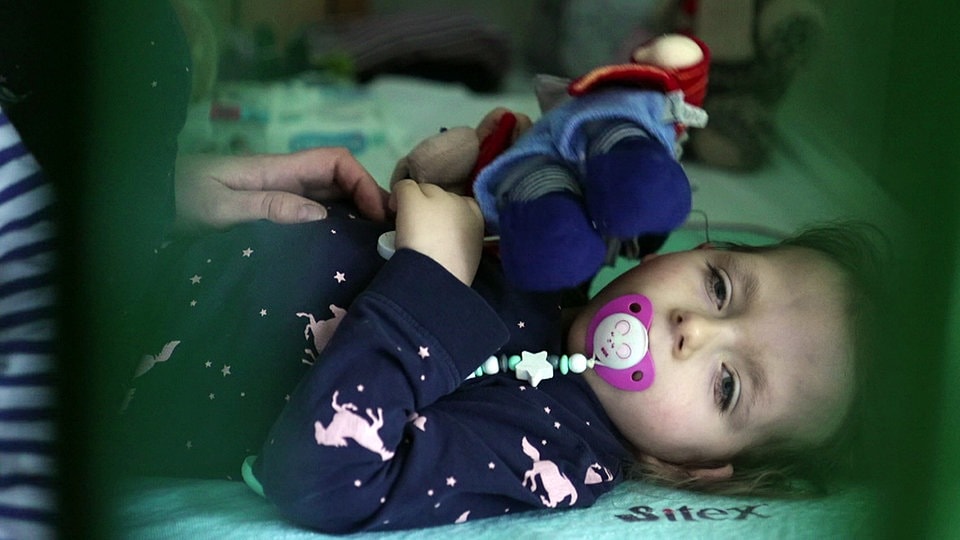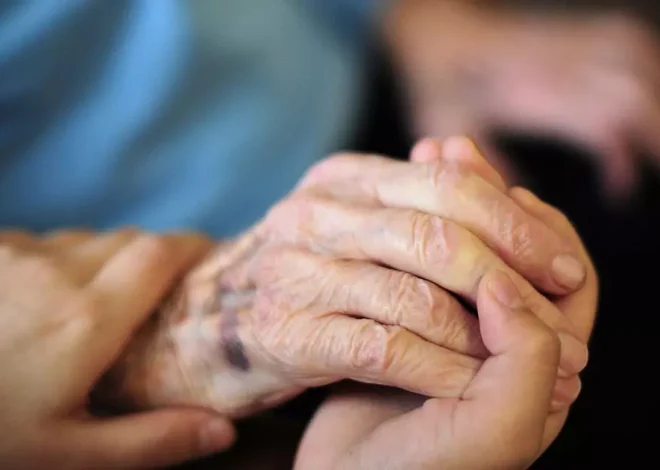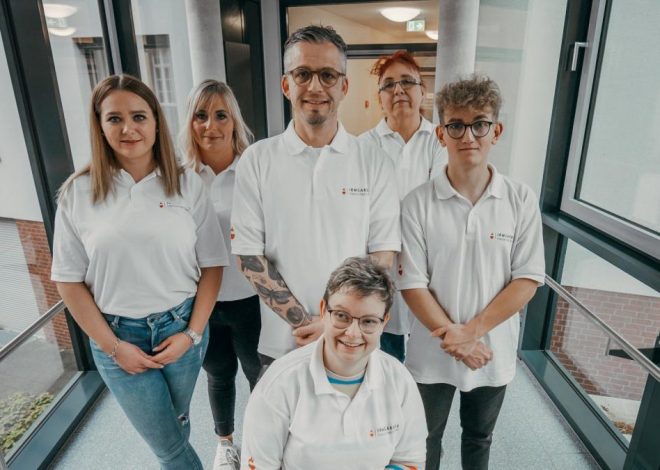
Work and care of relatives
There are currently around 4.9 million people in Germany who require care, and a large proportion of them are cared for at home. The cases of a married couple from Saxony and a family with a seriously ill child show the strain that caring relatives have to endure.
Brigitte Braun cared for her husband Manfred, who suffered from dementia, at home for ten years. Then caring for him and working no longer worked for her. The 72-year-old has now been living in a shared apartment for seniors for a year. “It wasn’t easy for me to hand him over to strangers, so to speak,” explains Brigitte Braun.
At first, Manfred Braun regularly went to a day care facility. During this time, Brigitte Braun was able to work as a museum curator. But as his dementia progressed, the provider stopped providing care. “He walked a lot and then had aggressive episodes, so that it was no longer tolerable,” explains Brigitte Braun. For her, there was a lack of reliable services and also a lack of a legal right to a place in care.
Image rights: MITTELDEUTSCHER RUNDFUNK
The Social Code Book XI states: “People in need of care in care levels two to five are entitled to part-time care in day or night care facilities (…).” However, experts say this entitlement is only a financing entitlement. Care insurance companies must pay their share of a place. However, there is currently no clear legal entitlement to a day care place.
Lack of places and rising costs
In addition, such a legal right would be politically difficult to implement at present. Ulrike Bahr, a member of the SPD Bundestag and chairwoman of the Committee on Family, Senior Citizens, Women and Youth, points this out: “It is a charming idea, although it is of course very difficult at the moment of the current discussion.” Because: “A legal right does of course mean expanding the structures.”
Of course, a legal claim actually means expanding the structures.
Ulrike Bahr | Member of the German Bundestag
There are almost 98,000 day care places nationwide. This is a supply rate of just 2.3 percent for the more than four million people in need of care who live at home. And another problem is becoming more acute: the personal contributions for day care for those in need of care are increasing. In the case of the Braun couple, the amount not covered by the nursing care insurance has more than doubled in the last five years – to over 530 euros per month.
Many affected people reduce the amount of time they spend in day care or give it up completely. This is because, unlike in inpatient care, there are no financial subsidies from the legislature for the personal contribution.
“I think it would make sense if there were also financial incentives,” explains Ulrike Bahr. The negotiations in the traffic light coalition are intended to create an overall package for family caregivers. Negotiations on this are to take place by mid-2024. However, due to the current budget situation, there is still concern that there will not be more public money for care. Nevertheless: “It can be done. We are working on it,” promises the politician. The government has a responsibility here.
Image rights: MITTELDEUTSCHER RUNDFUNK
Many relatives become poor through care
For many family carers, the current situation is poor because of care. A recent study shows that they are more likely to be affected by poverty than other citizens. Carers also claim social benefits more often than the general population.
One reason: caring relatives are reducing their working hours or giving them up completely. 77 percent of carers of working age work. And they work an average of 33 hours a week. Brigitte Braun also reduced her working hours. To 30 hours a week. Until that was no longer enough and she had to make a decision. “It was the decision not to leave the job, not to stay at home, that ultimately led to him being here,” she says, looking at her husband.
The difficulties of caring for sick children
Just like the Brauns, families of sick children also find it difficult to combine care and work. Nicole and Sandra Jobs’ daughter has a rare genetic defect. The five-year-old’s muscle functions are impaired. Swallowing difficulties are particularly dangerous and can lead to choking.
Nicole Jobs cared for her daughter Zoe for five years, and now she has a job again. This is a challenge: The clerk has to go to the office for the training period. But what happens to Zoe in the meantime? The seriously ill child cannot manage a full day at daycare. Intensive care at home was rejected by the insurance company. The probability of life-threatening situations occurring is not high enough.
Image rights: MITTELDEUTSCHER RUNDFUNK
So Zoe has to be cared for in an inpatient facility four days a week while she starts her career. Separated from her family. In addition, her care allowance is reduced from the first day in the inpatient facility. “We’ll definitely end up in the red during the training period. That’s already clear,” says Sandra Jobs. “But we still want to use it. It’s a stepping stone for us. For me,” adds Nicole Jobs. Sandra thinks she deserves a chance, and everyone wants the taxes, and there’s also a shortage of skilled workers.
Disadvantage by law
This legal regulation is a disadvantage compared to adults in need of care. They are entitled to care allowance for up to 28 days in a residential facility. A disadvantage that is at least a recurring topic in the government, as Ulrike Bahr explains: “It is of course really absurd to say that parents of seriously ill children are at a disadvantage here.” But she is not aware of any specific law that is currently being introduced.
It is, of course, really absurd to say that parents of seriously ill children are at a disadvantage compared to children they are caring for.
Ulrike Bahr | Member of the German Bundestag
In most cases, mothers are the primary caregivers of sick children. And almost one in four mothers no longer works because they have to care for their child. Nicole Jobs only applied for positions that allow home office work, because employers are not required to allow this.
She was looking for a job for a year. At some point she left out the fact that she had a severely disabled child in her application letters. “It was a feeling like that. That it was perhaps an obstacle or a reason why I was rejected again,” explains Nicole Jobs.
A solution for caring relatives
Nursing scientist Gabriele Meyer sees only one way to help family caregivers in the future: They need support from professional care and volunteer services: “I know that some regions actually lack these volunteer structures,” says the professor at the Martin Luther University of Halle-Wittenberg.
This must be encouraged – especially by local authorities. Local authorities must understand: “One of the tasks of the future is to develop a culture of care at the local level,” says Gabriele Meyer. “Because we cannot rely on being able to meet the high level of care needs only through professional support and only through relatives and family members.”
more on the subject
This topic in the program:MDR TELEVISION | MDR exact | January 10, 2024 | 8:15 p.m.
Show all
Show all

Ethel Purdy – Medical Blogger & Pharmacist
Bridging the world of wellness and science, Ethel Purdy is a professional voice in healthcare with a passion for sharing knowledge. At 36, she stands at the confluence of medical expertise and the written word, holding a pharmacy degree acquired under the rigorous education systems of Germany and Estonia.
Her pursuit of medicine was fueled by a desire to understand the intricacies of human health and to contribute to the community’s understanding of it. Transitioning seamlessly into the realm of blogging, Ethel has found a platform to demystify complex medical concepts for the everyday reader.
Ethel’s commitment to the world of medicine extends beyond her professional life into a personal commitment to health and wellness. Her hobbies reflect this dedication, often involving research on the latest medical advances, participating in wellness communities, and exploring the vast and varied dimensions of health.
Join Ethel as she distills her pharmaceutical knowledge into accessible wisdom, fostering an environment where science meets lifestyle and everyone is invited to learn. Whether you’re looking for insights into the latest health trends or trustworthy medical advice, Ethel’s blog is your gateway to the nexus of healthcare and daily living.



